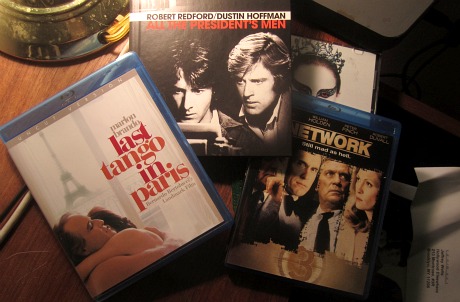Nice '70s Bath
The most richly detailed and eye-candyish of the three is MGM Home Entertainment’s Last Tango in Paris. Warner Home Video’s Network Bluray reps a modest but noticable improvement over the most recent DVD, and their All The President’s Men Bluray has darker tones than the DVD with stronger, punchier colors, better detail and a pleasant filmy texture. They all street on 2.15.
Here are DVD Beaver reviews for Last Tango in Paris, Network and All The President’s Men. Oddly, Gary W. Tooze writes that the Tango Bluray has “a less conventional appearance with an extremely grainy and thick image via MGM’s new 1080p Bluray…less concerned with pristine visuals and more prone to textures and capturing stylish spontaneity…there is still some noise but not all films achieve their best presentation value via digital.” What? I loved the look of this disc. I’ve never seen Tango look better.
X-Men Kiddies
I was hoping for a glimpse of Jennifer Lawrence‘s Mystique get-up, and I got JFK’s speech on the Cuban Missile Crisis instead. Already they’ve pissed me off.
Eight Years Ago
Earlier today I enjoyed re-reading a December 2002 HE piece about Spike Jonze and Charlie Kaufman‘s Adaptation. No biggie and nothing related to today except it reminded me how smarty-pants types have this tendency to pick on highly original films, or to misunderstand them, and that it always seems to take them a while to get past their issues. I called it “The Truth About Charlie.”
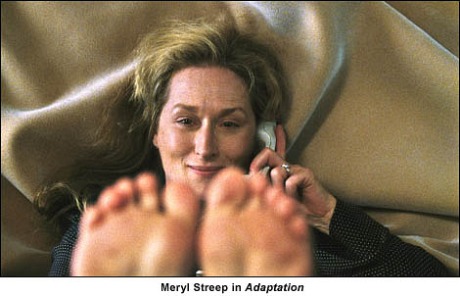
“Let’s cut to the chase about Adaptation (Columbia, opening Friday) and jump right into the Big Problem. The word over the last several weeks, partially fortified by my own opinion, has been about how wonderfully funny, trippy and original this Spike Jonze-Charlie Kaufman film is. Now, however, we’re hearing from a second wave of viewers talking about how nifty it all is until the third act, when Adaptation goes off the rails and falls apart.
“I don’t feel this way and didn’t even want to bring this up for fear of lending credibility, etc., but lately several people (including Time‘s Richard Corliss, The New Yorker‘s David Denby, my attorney friend Mark Kane and, according to credible sources, a good portion of the Motion Picture Academy, have been expressing these reservations, and the policy of ignoring them is now futile.
“And yet as recently as last weekend, I was still thinking about avoiding the issue out of respect for Kaufman, the Adaptation screenwriter who also wrote Being John Malkovich and Confessions Of A Dangerous Mind, and who is played in the film by Nicolas Cage. In interviews Kaufman has been doggedly avoiding talking about whether or not a certain character — his on-screen brother “Donald” Kaufman — actually exists, either within the film’s reality or, considering that Donald shares screenplay credit with Charlie in the Adaptation credit block, in real life.
“But the review in this week’s issue of Time declares flat-out that Donald ‘doesn’t exist,’ and the new issue of Newsweek adds ‘there is no Donald,’ so the milk is spilt and the gloves are off.
“About two years ago I reviewed Kaufman’s Adaptation script and called it ‘one of the most inventive and out-there scripts I’ve ever read.’ The main character, I explained, ‘is Kaufman himself, and that’s a big whoa right there. A screenplay about a screenwriter trying to write the screenplay? But it’s much more than that.
“The ‘subject’ of Adaptation is an actual, one-time orchid-worshipper named John LaRoche (Chris Cooper), whose attempted theft of rare flora from a Florida state preserve eight years ago resulted in his being prosecuted by the state and, from that, a New Yorker profile of LaRoche and then a book called ‘The Orchid Thief’ (Ballantine), by staff writer Susan Orlean (so named in the film and played by Meryl Streep).
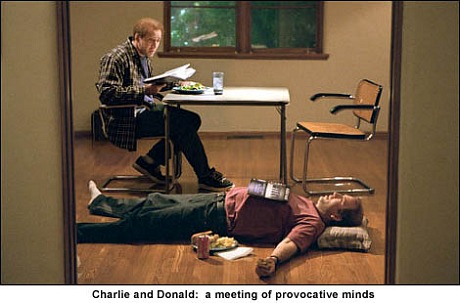
“Adaptation is primarily about Kaufman’s struggle to adapt ‘The Orchid Thief’ into script form, but it’s also about LaRoche and Orlean and the importance of nurturing a devotion in life to something perfect and beautiful. It’s about the striving of mortals to merge themselves with the sublime — Kaufman in his way, LaRoche and Orlean in theirs. Like the screenplay, the movie is half about Kaufman’s situation and half about LaRoche and Orlean’s. But it begins and ends inside Kaufman’s head.
“Foremost among his issues is an earnest determination not to turn Orlean’s book into formulaic Hollywood pap — no guns or shootings or scenes with gratuituous sex, he proclaims. And no characters growing or learning life lessons, or coming to like or appreciate people they didn’t like at the beginning.
“Kaufman is also dealing with pressure to deliver from a producer and his agent (based to some extent on Kaufman’s United Talent Agency agent Marty Bowen), his loneliness and longings for various women (including Orlean), and his frustrating relationship with his no-account brother, Donald, a dim-witted devotee of the famous scriptwriting instructor Robert McKee (Brian Cox) who’s trying to write a screenplay of his own about a serial killer.
“The reality is that Donald Kaufman is a diversion — a phantom character along the lines of Andy Kaufman‘s alter-ego Tony Clifton. As Donald is also played by Cage, you can accept him as a feckless, oafish boob who is Charlie’s brother and is in fact writing a moronic serial-killer screenplay, or as a mirror reflection of some kind — a wish-fulfillment image or maybe a crassly opportunistic side of Charlie’s own nature.
“The nifty thing about Adaptation‘s third act — what I really love about it, and not what confuses me or hangs me up — is that Charlie’s difficulties in writing an ending for his bizarrely self-referential script are both cynically and sincerely ‘solved’ by Donald and McKee.
“It was clear from Kaufman’s script that he considers McKee to be nearly the villain of the piece. Kaufman obviously despises the screenwriting principles McKee espouses in his classes and in his book, ‘Story’, which many feel have resulted in thousands upon thousands of screenwriters churning out the same type of cookie-cutter plots with the same mechanisms and rhythms.
“The irony of Adaptation is that Charlie, desperate to pull his script together, goes to one of McKee’s classes and asks for his help. He also enlists the assistance of Donald, who flies to New York and gooses things along by interviewing Orlean at her office (‘She’s lying!,’ he announces triumphantly when he returns to Charlie’s hotel room) and then persuading Charlie to join him on a fast hop down to Florida.
“The goal of this excursion is to see what’s really going down between Orlean and LaRoche who, it turns out, are having a passionate affair and involved in the selling of hallucinogens. They’re also more than willing to kill the brothers after their secret is discovered. But there’s an upside to these Michael Bay shenanigans: the brothers wind up sharing a tender moment together, and Charlie comes to realize how much he loves his dopier, less-hung-up half.
“Believe it or not, there are people who’ve seen Adaptation who are taking these pumped-up events half-literally, and not as a metaphor for Charlie-the-screenwriter’s ultimate act of adaptation — i.e., devising an ending that most Hollywood producers would probably be satisfied with, or that Donald might have written, or McKee might have sanctioned.
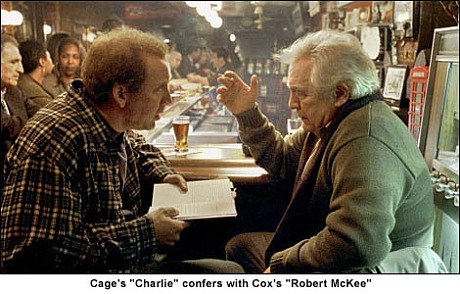
“Time‘s Schickel says the ending is ‘a desperation move’…[one] ‘we are unprepared for and don’t believe.’ In fact the movie has spent its entire length setting it up, quite methodically.
“Other naysayers are interpreting the ending as a cynical lampoon of third-act solutions of this type. What they’re saying is that while most of the movie is very un-cynical — cleverly comical, earnest, touched by sadness, exploratory — the Michael Bay-ish third act is an abrupt shift of strategy and tone, and that whatever the reason for it the lack of harmony with what has gone before is unsettling.
“They’re not wrong. Kaufman’s ending comes from his bitter feelings about Hollywood. My pet theory is that he really couldn’t figure out how to lick Adaptation, and therefore concluded that ‘Charlie’ wouldn’t or couldn’t figure out how to adapt ‘The Orchid Thief’ to his complete artistic satisfaction. So he turned Orlean into a drug-snorting, gun-toting infidel and gave LaRoche a gruesome send-off in a Florida swamp.
‘
“In short, Kaufman abandons who they are as New Yorker-born, flesh-and-blood characters and throws them to the lions (or alligators, as it were). I think this strategy is terrific nonetheless because it totally tabulates for a movie that, in its Hollywood depictions, has been almost entirely about the Charlie way vs. the Donald way of making movies. And because, the cynicism aside, I completely believed in the Charlie-Donald cuddle-up scenes toward the end.
“A word of praise for Cage, who does a beautiful job of bringing these scenes to life and making us completely forget we’re looking at an actor playing to himself. Charlie-Donald is his best role in years, and easily the most emotionally affecting performance of this type in film history. The guy from Vampire’s Kiss has returned after having nearly Jerry Bruckheimer‘ed and Joel Schumacher‘ed his career to death. For this alone he deserves an Oscar nomination and a hearty pat on the back.
“Streep’s Susan Orlean amounts to the warmest and most spontaneous performance of her life, I feel. And I totally agree with predictions that Cooper will end up a Best Supporting Actor nominee, mainly because he deserves to be. And each and every secondary female in this film is note-perfect — Cara Seymour, Judy Greer, Tilda Swinton, Maggie Gyllenhaal, Catherine Keener, etc.
“And a special round of applause for Ron Livingston‘s performance as Marty-the-agent. His anal-sex remark got the biggest laugh by far at a recent packed showing of Adaptation at the American Cinematheque. And I don’t mean just the loudest but the longest. You know a joke has really connected when you can hear people still laughing ten or twenty seconds later.”
Persistence
There’s no mistaking where Michael Angarano‘s anti-hero in Max Winkler‘s Ceremony (on demand 3.4, theatrical 4.8) is coming from. Relentlessly if not obnoxiously in love with an older, engaged Uma Thurman, Angarano’s Sam Davis is clearly descended from Jason Schwartzman‘s Max Fischer in Rushmore. How can Winkler deny the inspiration?
Days Like These
In a 2.10 Marie Claire interview with The Fighter‘s Melissa Leo, Thelma Adams has gone right to the big topic at hand.
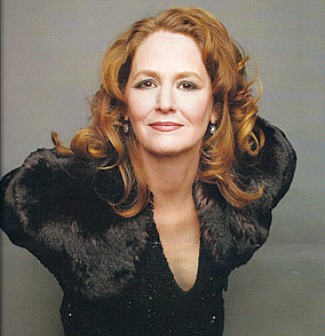
The Fighter costar Melissa Leo
Adams: “It seems that the big criticism has been that you’re the frontrunner behaving like the underdog.”
Leo: “Whatever my position might have been as we came in closer to the date with some wins in my pocket, I was not being told frontrunner. I could just feel in my heart this opportunity that has so vastly eluded me. I spent a month-and-a-half flying back and forth from the set of HBO’s Treme in New Orleans to L.A. to ‘pimp myself out’ like we all are doing this time of year.”
Adams: “So, what made you finally pull the trigger on this ad campaign?”
Leo: “I had deadlines to meet. In Sundance, we wondered: Should we put the ad in or not? Sure, it would just be fun, let’s jump and shout, because all I was going to say was ‘Consider.’ Here I am. Recognize me as this. It’s all okay.”
Adams: “Cue the firestorm.”
Leo: “The people I talk to know that I’m barely getting through each day. I don’t know if I would have thought of it alone, and nobody was saying to me that I was a frontrunner. There is something very disconnected about all of it because absolutely none of it is me. I’m known as an actor that people don’t recognize and as the characters that I play.”
Cannes Rundown, Digs
My personal preferences among Eric Lavallee‘s Cannes 2011 predictions include Dominik Moll‘s The Monk, Juan Antonio Bayona‘s The Impossible, Terence Davies‘ The Deep Blue Sea, the Dardennes brothers‘ The Kid With a Bike, Lars von Trier‘s Melancholia, Nuri Bilge Ceylan‘s Once Upon a Time in Anatolia, Pedro Almodovar‘s The Skin I Live In, Terrence Malick‘s The Tree of Life, Andrea Arnold‘s Wuthering Heights, Lynne Ramsay‘s We Need To Talk About Kevin, strong>Gus Van Sant’s Restless and Marina Zenovich‘s Roman Polanski: Odd Man Out.
I’m primarily pleased about HE’s new Cannes lodging. After learning yesterday that a Cannes apartment I’ve been sharing for the last two years is no longer available, I got lucky right away through a columnist friend and found a new place at almost the same rate and at a slightly better location (i.e., closer to the Palais).
Huge Embarassment
Could The Daily have blown it any worse? That alleged Nikki Finke photo that they posted this morning, taken by Hunter Walker, is reportedly a fake. Finke has told Gawker that it’s not her, and Anne Thompson and TheWrap‘s Sharon Waxman, who both know the Deadline founder, agree.

I suspected right away that the shadowed woman in the car wasn’t Finke. Her eyes are too vulnerable looking. That look she’s giving Walker seems to say, “Oh, no, wait…wait a minute…are you taking a picture of me?” She doesn’t look like a wolverine but some kind of blonde basset hound. She has the eyes of someone cautious, uncertain, a little scared of things. Like someone who works in a pet hospital or a beauty salon. Or who sits around the house and does nothing while her husband works.
In any event you’d think that Walker, apart from being wrong, could have taken a better shot than something this dark and hazy, though a Toyota windshield. Or that The Daily would have checked around before posting it, just to make sure.
Academy, Save Thyself
In the view of Daily Beast contributor Marlow Stern, AMPAS “should do the right thing and honor The Social Network over The King’s Speech with the Best Picture Oscar, lest they risk further alienating the younger generation of movie fans who have caught on to the Oscars’ blandness and predictability. This lack of imagination is one of the reasons why TV ratings for Hollywood’s biggest night have dropped precipitously from a high of 57.25 million viewers in 1998 — the year Titanic cleaned up at the awards — to just 41.3 million in 2010, despite nominating 10 films for the Best Picture Oscar instead of five.”
Has Joe Wright Sold Out?
In Joe Wright‘s upcoming Hanna (Focus Features, 4.8), Saoirse Ronan plays a teenaged girl raised by her ex-CIA dad (Eric Bana) to be a killing machine. That’s not wildly different from Chloe Moretz‘s “Hit Girl” backstory in Kickass, or Anne Parillaud‘s in La Femme Nikita. And we all know the territory, of course. Knifings, garrotings, lotsa bodies, speeding vehicles, rapid cutting, people going “aarrrgghh!”
So how did Wright, who began his British directing career as the new Anthony Minghella when he made Pride and Prejudice (’05) and Atonement (’07), manage to turn himself into an upscale hack in the Martin Campbell mold? He had the strong camera eye and the extended tracking shots and the mining of adult emotion, and now look at him. Look at the Hanna trailer, I mean. He’s shoveling popcorn.
Any way you slice it’s a weird transition. Did Wright find himself in a career funk after the failure of The Soloist and felt he had to somehow break himself out?
Is there an analogy between Wright doing a semi-predictable action-genre piece (how much do you wanna bet that Cate Blanchett turns out to be Ronan’s mom?) and Sam Mendes, another cultivated Brit director with mature emotional leanings, doing the next James Bond film? It’s the marketplace, of course. If you want to work you have to serve the tastes of the public, and the public, more and more or at least for the main part, often responds to formulaic crude-slick action fare. Not an American-type thing but something like Hanna, which is apparently of a lower order.
If nothing else, the presence of Eric Bana should give anyone pause. I’m sorry but life has taught me that if Bana has a role in a film, it’s most likely a problem of one kind of another. (The only variation in this rule has been his semi-comic role in Judd Apatow‘s Funny People.)
I'm Not Going!
4:07 pm: Tens of thousands in Cairo’s Tahrir Square are reportedly furious following Hosni Mubarak‘s refusal to step down in a speech he just gave a few minutes ago. While saying again that he wouldn’t run for president in September, Mubarak said he’ll transfer powers to Vice President Omar Suleiman, but will “continue the oath of his office” and will “continue to shoulder” his responsibilities and work for a peaceful transition of power.
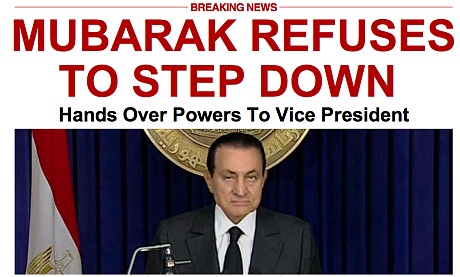
Earlier: Apparently the Egyptian military has stepped in and told Hosni Mubarak, “Okay, enough is enough, pal…that’s it, you’re out.” Mubarak will give his farewell address on TV fairly soon (i.e., a couple of hours from now). What’s happened, apparently, is some kind of “soft coup.” What this means for the various aims of the Egyptian protestors and the eventual implementation of democratic reform is yet to be seen.
A N.Y. Times story is reporting that “the military’s chief of staff, Sami Anan, made an appearance in Tahrir Square, where he pledged to safeguard the people’s demands and their security. Thousands of protesters roared in approval.
“Gen. Hassan al-Roueini, military commander for the Cairo area, also appeared in Tahrir Square and told the demonstrators, ‘All your demands will be met today.’ Some in the crowd held up their hands in V-for-victory signs, shouting ‘the people want the end of the regime’ and ‘Allahu akbar’ or “God is great,” a victory cry used by secular and religious people alike.
“The moves marked a decisive turn in an uprising that has brought hundreds of thousands into the street in the most sweeping revolt in the country’s history. So far, the military has stayed largely on the sidelines, but Thursday’s statement suggested it worried that the country was sliding into chaos. The military called the communiqu√© ‘the first statement of the Supreme Council of the Armed Forces,’ strongly suggestive that it had arranged to take power in Egypt.
“Wael Ghonim, a Google executive and protest organizer whose anti-torture Facebook page helped spark the movement, wrote on his Twitter feed Thursday evening: ‘Mission accomplished. Thanks to all the brave young Egyptians.'”
Last 2010 Oscar Shot
Last night Deadline‘s Pete Hammond reported that he’s “picking up some interesting trends” in his chats with Academy pallies. “Not just the expected strong support for The King’s Speech (it’s real), but also a surprising amount of backing for The Fighter. It has been the most mentioned movie after The Social Network and could figure significantly by drawing mostly first- and second-place votes.”
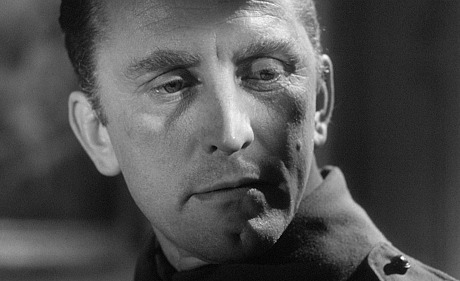
“Because you don’t know the answer to that question, I pity you.”
He also noted that while “some” of his Academy pallies “have already cast their ballots, most have not.” So if there’s any point in making a last-minute plea to any fence-sitters out there, it needs to happen right now. So here’s my last attempt to influence the final vote, however slightly or marginally.
BEST PICTURE: I realize that The King’s Speech crowd is unreachable, intractable and adamantine. All they want to do is vote for the movie they like the best. That’s all they care about. It doesn’t bother them that they’re about to contribute to a Great Historical Embarassment along the lines of the Academy’s giving the Best Picture Oscar to Driving Miss Daisy, Chicago, The Greatest Show on Earth, Dances With Wolves and Around The World in Eighty Days. They’ve apparently got some kind of weird enzyme in their system that blocks any sense of shame or hesitancy about this.
Allow me to paraphrase words spoken to a military tribunal in Paths of Glory by Kirk Douglas‘s Colonel Dax: “There are times when I’m ashamed to be a member of the industry-supported, Oscar-following community, and this is one such occasion. Ladies and gentlemen of the Academy, proclaiming to the world that you sincerely believe that The King’s Speech is the Best Picture of 2010 reveals a mediocre sensibility. It will be seen in the eyes of history as a very pedestrian call, and will haunt each of you, due respect, to the day you die. I can’t believe that the wisest and noblest impulse among movie lovers, which is the ability to recognize the difference between a very good and highly likable film vs. one of exceptional craft and dimension and incandescence, can be completely dead here. Therefore, I humbly beg you to come to your senses, forget about what you ‘like’ and think of the contempt and derision that may be your legacy for decades and centuries to come.”
BEST DIRECTOR: You know it has to be The Social Network‘s David Fincher — you know it does. Forget the DGA call. This is your deal. Good effin’ God…please.
BEST ACTOR: Colin Firth, The King’s Speech — a fine performance, a well-liked fellow, a done deal.
BEST ACTRESS: If you’re really going to give the Best Picture Oscar to The King’s Speech, you just can’t go “full fart” by giving the Best Actress Oscar to Annette Bening, as good as she is in The Kids Are All Right. You’d be creating a rep for the Oscar telecast as the Baby Boomer Movie Awards, which will obviously hasten its irrelevance, and the Movie Godz would completely freak out. You have to stay with Black Swan ‘s Natalie Portman and show respect to the millions of women who’ve been flocking to this film and who will push the total gross to over $100 million.
BEST SUPPORTING ACTOR: You’ve got to stick with The Fighter‘s Christian Bale. Forget about any last-minute shift to The King’s Speech‘s Geoffrey Rush, as wonderful as his voice sounds when it’s been well-amplified with sub-woofer speakers.
BEST SUPPORTING ACTRESS: Whatever feels right. My favorite performance was given by Amy Adams in The Fighter because it was my favorite character, but the actress I most admire at this stage of the game and therefore must support is the great Melissa Leo. In the words of David Poland, “If you were going to vote for Melissa Leo and are considering not voting for her because of [her self-financed] ads, you are an ass.”
BEST ADAPTED SCREENPLAY: Aaron Sorkin, The Social Network.
BEST ORIGINAL SCREENPLAY: If you give the Oscar to The King’s Speech‘s David Seidler, then okay, whatever…it took him years to get there and he did a very good job. And he may have cinched it when he answered that question I asked him during the Santa Barbara Film Festival “It Stars With The Script” panel. But it ought to go, I feel, to Inception‘s Christopher Nolan for the extraordinary vision and originaltiy.
BEST ANIMATED FILM (FEATURE): Toy Story 3.
BEST DOCUMENTARY FILM (FEATURE): Inside Job.
BEST FOREIGN LANGUAGE FILM: Biutiful.
BEST ART DIRECTION: Inception.
BEST CINEMATOGRAPHY: Roger Deakins, True Grit.
BEST COSTUME DESIGN: Alice in Wonderland.
BEST FILM EDITING: The Social Network.
BEST MAKEUP: You can’t give it to The Wolfman…no! And you can’t give an Oscar to Barney’s Version for putting wigs on Paul Giamatti. Default winner: The Way Back.
BEST ORIGINAL SCORE: The Social Network.
BEST ORIGINAL SONG: “We Belong Together,” Toy Story 3.
BEST SOUND EDITING: Inception.
BEST SOUND MIXING: Inception.
BEST VISUAL EFFECTS: Inception.


